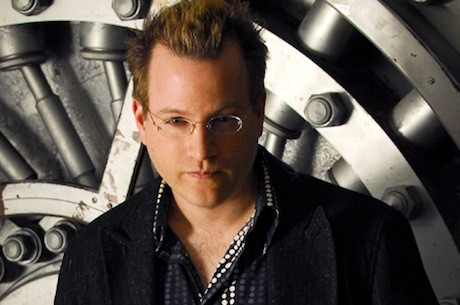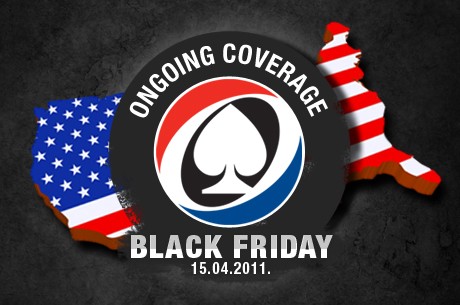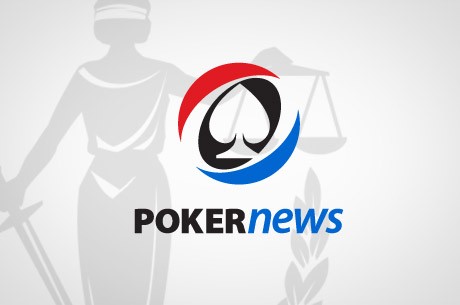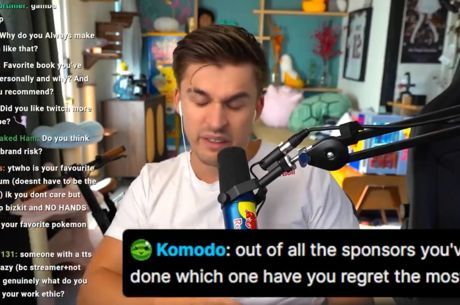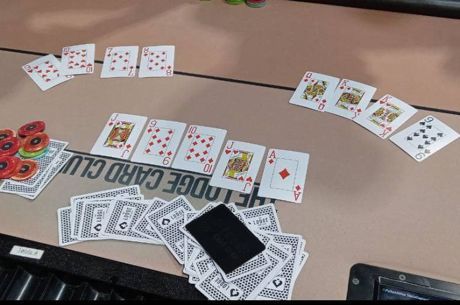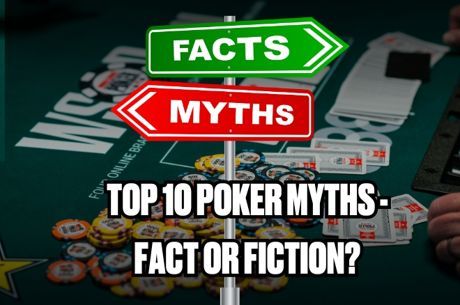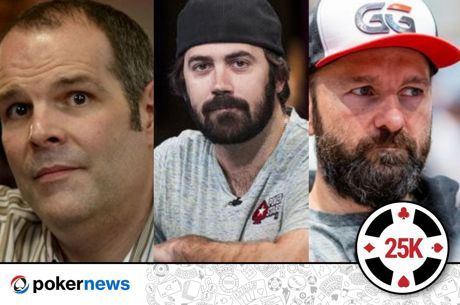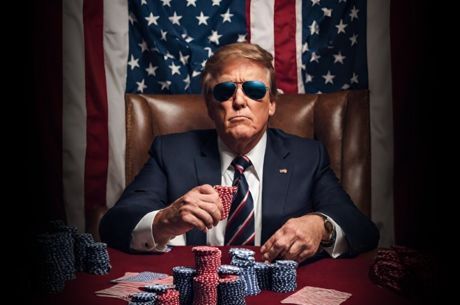Exclusive: Ben Mezrich Discusses Straight Flush, Truth About Absolute Poker, and More

In late May, right at the same time the 2013 World Series of Poker began, acclaimed author Ben Mezrich released Straight Flush: The True Story of Six College Friends Who Dealt Their Way to a Billion-Dollar Online Poker Empire--and How It All Came Crashing Down.... The six college friends were the founders of Absolute Poker, which was shuttered on April 15, 2011 as part of what's now been deemed by the online poker industry as the Black Friday indictments. Since the release of the book there has been a lot of chatter about the accuracy of its text, which Mezrich deems "Narrative Non-Fiction," and in particular the chapters that detail the Absolute Poker cheating scandal.
In late June, I had the opportunity to sit down with Mezrich in his office in Boston for an exclusive interview. We talked candidly about the process of writing the book, how heavily the main characters were involved in the telling of the story, the discrepancies between the cheating scandal as presented in the book �� and other accounts which can be found online, and whether or not Mezrich felt as if the subjects were being honest with him.
Parvis: Ben, talk us through the process of getting involved in the Straight Flush project.
Mezrich: It started with Bringing Down the House and 21 and expanded with The Social Network. I get 20 to 30 pitches a week and they go into my website or go into my Twitter. Every college kid who has done something crazy will pitch me a story. The Julian Assanges of the world all pitch me their stories.
A couple of years ago, I��m not even sure when, a pitch came through about this story from Garin (Gustafson), one of the founders [of Absolute Poker]. I kind of ignored it. Online poker, I played a little bit but didn't know enough about the industry and wasn't sure if it was something I wanted to write about. Then a second pitch came in from Pete Barovich. I believe they didn��t know that the other had pitched me, but he pitched me also. Pete��s pitch was a little bit better, and I was thinking this is kind of fascinating. So I started to look in to it. It had the elements I look for in a story: guys going off to exotic locations, tons of money, lots of intrigue, and complex things going on. Then there is the cheating scandal, and the UIGEA and the fall of an industry. So, it had that cool arc that I look for so I was intrigued. I started talking to Pete, who was the first guy I started talking to in Phoenix. It was pretty fascinating.
Then came the process of finding out how many sources I can get. I managed to get to all of the guys, and they all seemed willing to talk. Scott Tom was the most reluctant. He did not originally want to talk to me probably because of the whole 60 Minutes thing, and a lot of people had come after him and he was in Antigua and he was trying to figure out what he was going to do about the indictment and the government and all that kind of stuff. But I met with him and convinced him to be a source as well. So that��s where it all got started. I had very limited knowledge I would say compared to a lot of your readers probably. But I had played online poker a little bit, and I also played poker with friends.
I hadn��t wanted to go back in to cards, or Vegas or anything like that since Busting Vegas. Since Social Network, I had a lot more mainstream projects going on, but I was fascinated by the fall of an industry. I thought that was really cool. It seemed like a blend of 21 and The Social Network, so that��s why I jumped in.
Was there any hesitation being that you got hard pitches from two of the founders. You mention Garin and Pete both pitched the story. Were you at all concerned there was an agenda?
Well no, you want to do a story like this. For me anyways, having the sources available to you is the most important thing. I would much rather write a book when the people involved are willing participants than when they are not. With The Social Network, I ran in to that problem where Eduardo came to me, then the Winklevoss twins, Sean Parker, but Mark (Zuckerberg) wouldn��t talk to me. And that��s difficult. You want Mark to talk to you. In this case you want Scott to talk to you. Writing this story without them being involved would not have been a good story. It was quite the opposite of concern. I was thrilled they wanted to be so open and tell the story.
How long does the vetting process for your books last?
It��s a process. It��s a few months. Part of it also involves your agents and a lot of other people. When I do a project it��s a big time commitment for a lot of people �� the publishers, the movie side. You want to pick a project that has legs. Something like this probably took a few months.
Then it boils down to handling all the interviews, which took place both via Skype, and through trips around the world. Then there is the process of getting all the court documents. I got thousands of pages of documents and not just the indictments, but every trial that was going on. Then anything involved with any of the people themselves like newspaper articles, and all the blogs. You have to go through all the material to see exactly how the story is going to go, but yeah, it took a while.
Tell us about your experience playing poker or online poker.
Since 21, I��ve spent a lot of time in Vegas. I spent time there with the MIT Blackjack team, and I��m a gambling kind of person. When online poker was kind of hot, I think I was on PokerStars mostly. It was never for a lot of money. I think at most I might have had a thousand dollars online. I lost it all. I stopped playing, because mainly my concern was how do I know who I��m giving my credit card to? Where is this money going? I think a lot of people have the same concerns when putting their credit card on the Internet. You��ve got to remember back then it was crazy that you were giving your credit card information to some small bank in some South American country. It��s like what��s going to happen? So I think I stopped for that reason. I thought, ��who knows what��s going on.��
I liked it, and I always felt like it was foolish that it was illegal. Why is this illegal? I can buy lottery tickets in the supermarket. I can go on Ameritrade and bet my entire retirement account on a random penny stock, and no one is going to limit me from doing that, and that��s sheer gambling. So I never had an issue with it legally. I was fascinated by it. So yes I played but my friends would laugh if I said I was a good poker player. I am really good at folding into third [place]. That��s my tournament skill. I can fold a pair of aces, easily. You know, preflop, I��m happy to do it.
You mentioned that you got full cooperation from the key characters in the book. Can you expand on that?
Yeah, all the main characters: Garin Gustafson, Pete Barovich, Scott Tom, Hilt Tatum, and Brent Beckley, who I talked to pre-prison right up until he went to jail. Then the dad, Phil Tom, who is a hoot you could say. Those were obviously the inside guys. There were other people who I would email with who I didn��t really talk about. Sources who wanted to remain unknown. There were the court documents as well. That was pretty much most of my sources.
It��s interesting to me the different roads the two brothers took. Brent Beckley made the decision to turn himself in, and face the music, while Scott Tom is still at large. Did you notice a big difference in attitude between the two?
I felt bad for Brent. Brent is a really sweet guy. If you talk to Brent, he is a very nice guy. I don��t think anyone who knows him will have anything negative to say about him. I think he was naive. I think he did things that were foolish. I think he knows that he was at risk. He knows he was putting himself in that danger position by being the payment processor. He really looked up to his brother and still looks up to his brother. Scott really did want to take care of his brother but Scott is more of the cowboy, more of the dangerous kind of guy. I think Brent ended up getting in over his head. For him it was fun, it was crazy, and it was an opportunity. Then when he got sentenced he was very upset. He did not ever expect to go to jail. I think the prosecutor let him know he wouldn��t go to jail. I think even his own lawyers said you��d never go to jail. He thought he was turning himself in to start a new life and thought he would be able to get his kids back into the United States, which he did. I think he turned himself in thinking he would pay a fine and go free. Instead, a judge decided to make an example out of him. So he was very upset when I talked to him. He didn��t deny what he had done. In court he pled guilty even though he thought what he was doing shouldn��t be considered a crime.
Scott, on the other hand, was terrified about his future because he had no idea what was going to happen. I went to Antigua and spoke to him in person. He can��t leave the island. He��s afraid to get extradited or taken away or get a bag put over his head and get dragged in. He��s facing a big indictment. I think he��s trying to get some sort of a deal but the amount of money they want is an enormous amount of money. He claims he doesn��t have anywhere near that kind of money. He is a charismatic individual. He is definitely complex. He��s one of those guys who are hard to get down on paper. There are two sides to Scott, I think. If you talk to everyone how knows him well they either love him or hate him. I think he��s a fascinating character. But they are both very different people.
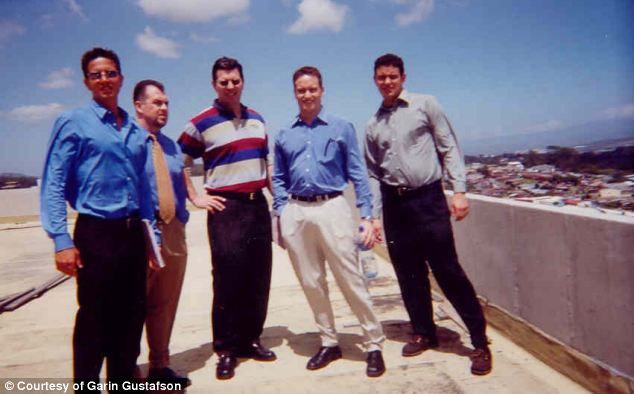
Do Beckley and Scott Tom have a different take on the events that took place? Was it difficult to piece together a cohesive story?
Yes and no. There are certain times when talking to Brent when he will say one thing then at a later time he��ll say something else. Scott was pretty clear on how he felt about things. Scott clearly feels that the government did both him and Brent wrong. He felt he tried to protect everyone as much as he could and stepped away from the company as long as he could so he shouldn��t have been in trouble for everything. Brent waivers back and forth when you talk to him. He just wanted it all to be over. He wasn��t as adamant about the right and wrong of it. He just wanted it to be done. I think Brent was upset and very frustrated that he was the fall guy. When I was first talking to him he felt like, all these other guys aren��t going to jail but here I am going to jail. But then after he was more resolved about it. There��s a line in the book from him that says, ��it��s not cancer. I��ll get through this.�� So I think he became resolved to it. I think originally he probably did blame Scott, but then he transitioned into believing it really wasn��t fair to blame Scott at all. In fact, he felt it wasn��t fair to blame anybody. He was taking responsibility for himself.
Do you get the feeling that they were all well aware of the story going mainstream and public, and may have spun things to make themselves look better?
When I was meeting with them they were very concerned because they had no idea what I was going to do. They didn��t know whether I was going to take a big negative view of them or if I was going to take a more positive view of the whole situation. They had no control over what I was going to write. I could have come out of there with any story I wanted and I think they were terrified of that thought. A lot of the times the meetings were interesting because they were scared about what they were saying to me. Anytime they had spoken they had been screwed in some way. There weren��t any lawyers around because I didn��t want to work that way. The first meeting was with Scott, Hilt, and Scott��s dad in Antigua. I would then meet with Hilt in Toronto because Hilt wouldn��t come to the U.S. He is not under indictment but he is afraid of being subpoenaed and lives in Panama, and goes to school at Oxford. So on his way to London, he would meet me in Toronto. I met Pete in Phoenix, which is where he lives. The interviews with Shane and Garin were mostly over Skype.
What was something that surprised you during the interview process?
When I first read the story you imagined this whole thing with money on a plane and guns with a whole bunch of craziness. When you met with the guys, they were all very nice and were really smart. Hilt, especially, comes off incredibly well spoken with business knowledge. It was like interviewing Wall Street guys, not like interviewing cowboys or hicks or anything like that. Their willingness to talk about drugs and prostitutes was surprising to me. All of the elements that as a writer you have to pull out of them, they were perfectly willing to talk about. Brent told me about the drugs in his shoe. I mean these stories are usually harder to get out of people. They were very open. The only time they were less open is when you bring up the cheating scandal. That became more difficult to get into. In terms of the decade-long story they were very open.
We��ll certainly get to the cheating scandal as we move on. How deeply entrenched with the online poker world do you think you became?
With the poker world not that much, but with their story I felt like I was really getting into it. With everything I write, it could take 10 years or six months to write the book. As an author you have to make a choice as to what kind of author you want to be �� someone who spends his career writing a book, or will you finish it in a civilized amount of time? For me, you have to cut yourself off at some point.
I skimmed through information on the scandal online. I will say there were a few good sources of information on the online forums, but a good chunk was just people yelling at each other.
I think 2+2 had some interesting stuff. That was the site that pretty much broke the story so I thought it was a great place to look. You know, wherever Google led me is where I was looking. I don��t know the players in the blog world so I don��t know whose post I was ever reading. I was skimming through it for background information. In terms of the cheating scandal, there was a lot of material.
At any point during the process did any of the characters recant their statements?
There were a lot of times when Scott would reconsider his involvement in telling the story. So yes, there were a lot of moments where they were terrified. Every book I write is like that. There is always a point in every book I write where the main character says I don��t want to do this anymore. It��s usually too late too. It��s their decision but I always say, ��Listen, if you want to tell your story you have to take a leap at some point.�� Then there comes a point when it is just too late. The book is about to come out and you have people who don��t want to follow through. I think these guys were nervous all along except for maybe Pete. Scott was definitely nervous through the whole process. I think he��s still nervous.
How did you feel about your finished product, once you submitted your draft?
I handed in a draft that I thought was compelling. I liked it and thought it fit with what I typically write. In early drafts of the book I let the guys see it because I wanted them to see whether it was accurate enough or not. They all said it was extremely accurate. The Wall Street Journal Review was obviously not a positive review but in general it was positively reviewed. The Globe loved it, Publisher��s Weekly loved it, and with The New York Times if you know my relationship with Janet Maslin then it was a very positive review. Janet has an issue with me, which I find fun. She has trashed every one of my books from the beginning but it��s been more and more exciting each time. This time she actually liked it despite herself. Overall it was well received and the people who read it liked it.
I write narrative non-fiction. I do the research, interview all of the characters, put all the material together, and write it like a thriller. I don��t write it like a documentary or like an article for The New York Times. I write it like a narrative thriller. This is what I do and I am very clear about it. No one is going into a Ben Mezrich book thinking they will be reading an article from the Times. They know it will be written like a thriller. So there is recreated dialogue. Often there is compression of the chronology. In this case, I used real names, while in some books I haven��t been able to do that. Each time a book comes out there will be a certain set of journalists who will angrily write about it, while others will love it. It��s part of the game. It��s been 10 years of writing books and for 10 years it has been the same discussion. All I can say is if you don��t like this form of non-fiction then you are going to have issues with it. I feel it is a very valid form of non-fiction. There was a time when Bringing Down the House was on The New York Times Best-Seller list at No. 3. People were very upset and thought it shouldn��t be considered non-fiction. The No.1 book at the time was John Stewart��s America: A Fake History of the United States. There wasn��t a single thing in that book that was non-fiction. No one talked about that but my book people did talk about. It��s just a group of people who are searching for a story. I��m very open about my process. Some people are going to accept it and some people aren��t.
In the book the characters refer many times to wanting to do business in a "legitimate way," and they even point to some of the illegal online sports books as companies they didn��t want to mimic. But then, something that��s not mentioned in the book �C is that Absolute Poker pretty early on was offering up Blackjack to its customers, which clearly was illegal, and not quite the "grey area" as poker was.
Should that have been in the book or not? I think in retrospect, if I had known about it when I was writing the book, which I didn��t, I may have added it. I don��t think the over-arcing story changes with that. I think that was something they were trying out but yes; I think a lot of that is Scott��s feeling like they were doing the right thing all along. Although personally, why is Blackjack wrong? Is that a bad thing? I wouldn��t choose Blackjack as an issue. You also have to remember that a lot of things got real screwy in that industry. It was very shady. I like to describe it as a prohibition company. So during this prohibition era, essentially, it was a dirty world. So the idea that they allowed Blackjack on the site for a short period of time, it��s all there. Brent openly said they were faking things. In Scott��s opinion, it was a stupid law that the banks knew exactly what was going on because one day the bank was getting all this money from online poker and the next they were getting the same amount of money from golf balls. Of course they knew what was going on. He didn��t think it was a big deal. I think that��s why he went to jail. I think, personally, I agree with him. Would I have done what they did? No. When Bringing Down the House came out I was approached by a lot of poker companies to become a spokesman. I talked to my people about it and decided to stay away. Truth is, who knows what the heck is going on in this industry? Who knows if this is legal or not? We don��t know. So I turned down large amounts of money to work for these companies. So no I would not have done what these guys did. As soon as 2006 came around I would have folded. I talked to Scott about this a lot. I asked him, 'Don��t you think in 2006 you should have just walked away?' He probably had a lot of money and they could all have been sitting in mansions in the United States. His response and opinion is even in 2006 he didn��t know that it would lead to this. He didn��t think it would be prosecutable. He said that he talked to lawyers who said it��s not an act that could be held up in court and would be knocked down at some point. Then he said he did walk away shortly after that.
That��s something that is still a discussion. A lot of people don��t agree that it is actually what happened. He claims that after 2007 and 2008 he wasn��t really involved with the business anymore. The guys were actually pretty open about handing it off to Joe Norton to protect themselves. That��s in the book too. I think he really believed that no one would be indicted. However, he did pass that rule that no one was allowed to come to the U.S. anymore, and many people left the company at that point.
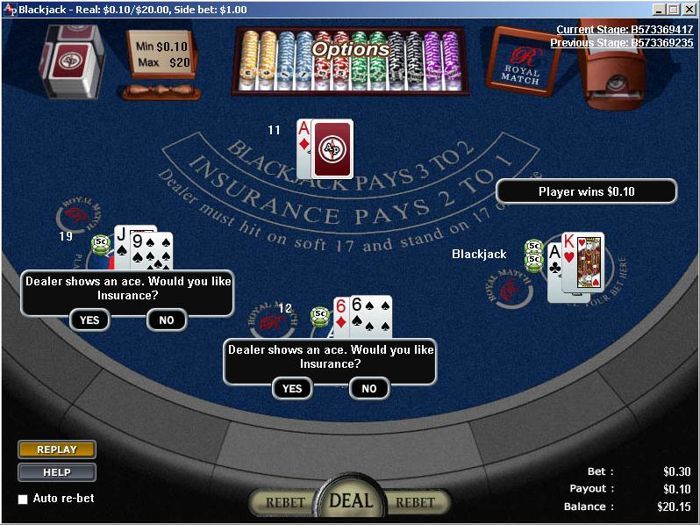
Let��s dive in to the cheating scandal ... (Mezrich immediately jumps in)
First thing. Everyone who heard I was writing a book about Absolute Poker, the only thing they wanted to see was a 300-page book about a cheating scandal that happened a number of years ago that lasted probably seven or eight weeks, where people lost $800,000 that was paid back. That is the book that people wanted to see. They wanted to see a book about the cheating scandal. They wanted to see Scott hung up as a cheater. The wanted to read that the founders of Absolute Poker were cheaters and that they were lying liars who lie. That is the only book that this group wanted to see. Now, I was not writing a book about the cheating scandal. There could still be a book about the cheating scandal. I was writing a book about the rise and fall of Absolute Poker and the fall of an industry, which was to me a much bigger story. I��m not even getting to the AP stuff yet because that��s not really the same story. That��s a totally separate story.
When we got to this part of the book, I had a fair amount of information from the blogs and interviews. To me there was no smoking gun, no proof that would hold up in a court of law nailing Scott to anything. I do think what is in the book is a very accurate portrayal of the situation. I��m saying this because most of your readers haven��t read the book and are arguing about something that they haven��t read. What it says in the book is this: a bunch of players who are on the 2+2 blog figured out that someone was winning too much. One of those players went to the AP people and was somehow sent a document that had all these players hands on them. Then the AP people themselves denied it because they didn��t think it was actually going on. They had been getting complaints for years about cheating. It��s just the nature of the business. Anytime anyone loses they assume someone is cheating. I have never walked out of a casino in my life and not thought that someone was cheating. Most people feel that way. So the AP guys didn��t believe there was cheating going on, okay? Then using that document, the 2+2 bloggers were able to figure out that in fact there was someone who obviously had access to people��s cards. There was a cheater. This is all in the book. Someone was a ��super user�� is what they called it. Whether or not that is what it was they didn��t know but they felt it to be true. Also when they went back to the email addresses it seemed to come from an old email of Scott and from a computer that was either in his office or house. The AP guys claimed that they went to Scott with that information and Scott said let��s figure out what is going on here. He was furious about it. They tracked it to a very close friend of Scott who had been working at the company who used Scott��s computer and email. He was able to do this using an old piece of software that was there from the beginning. That is all in the book. Now whether you believe that or not is fair to argue. If you have information that shows that it��s not true then I think it is great to write about.
You mention a lot of the sources that reference other information could not be used in the court of law, but why couldn��t it be used in a debate between you and the subjects of the book to obtain more information? There are IP logs, emails, and a lot more out there than the story you painted.
When you talk to Scott about the IP addresses he says this guy had access to my computer and was in the inner family essentially. He had access to everything. He said ��why would I cheat?' You know, he said it was a multi-million business with millions coming in, 'why would I be sitting there in my room cheating?' He denies it.
If they were so adamant about not cheating, why didn��t they out the person who they say was the actual cheater?
They say they went to that person and in exchange for him telling them exactly how much he took and how he did it they would let him leave the company and not be named. It was someone who they said was an operational person who had access to everything. The guys never once told me who it was. Obviously you can read that and say they��re lying. Scott did it.
What was your opinion on whether or not they were lying about the cheating?
I went back and forth about this. When I originally went into it I thought Scott wasn��t going to tell me the truth about the cheating. When you talk to Garin, Hilt, and those guys, they don��t really know for sure what was going on. Pete certainly said it was a surprise. None of them believe Scott did it because they felt like Scott didn��t have a reason to do it. The idea that he needed an extra $800,000 compared to the amount of money they were making seemed ludicrous to them. They also feel like it was so detrimental to the company, that is what Scott��s baby (the company), that he lived and breathed for this company that why would he put the entire company at risk by doing something stupid like this? So they didn��t feel he did it. You know, for me as a writer, it is impossible to come down one way or another without some really strong evidence. By strong evidence it can��t be a list of accounts that I don��t know where they are from that appear on some blog.
I saw a screenshot (of some of the evidence) but what am I really looking at there? Show me where that came from, give me the affidavits for the people who posted that. If you were able to give me all of that then I would have something to go on. As a blogger it seems you can write whatever you want, but as a journalist writing a book you can��t. The first thing your lawyers are going to do is say what is this I am looking at? You are accusing someone of fraud so you need to be able to prove this in a court of law or you can��t put this in the book. So what are you left with? I mean, I feel as it is written in the book, is a very fair depiction of it.
A lot of people read the book and come out saying, well this sounds like Scott cheated. A lot of people read the book and say it sounds like Scott didn��t cheat. A lot of people say the author is trying to white wash something or that it is thrilling and who knows what actually went on? I think that is a fair way to write it in the book. Absolutely none of the guys think Scott cheated. You can ask them. They know cheating was going on and felt like it was handled very well. They��ll tell you it went on for seven weeks and everyone was paid back. The idea that everyone is saying they were cheated out of their money just isn��t true. A very small group was cheated out of their money and was paid back. All the other people who claim they were cheated out of their money actually weren��t and just lost. Some think this was going on from the very beginning. I don��t believe that. Why would Scott start a company to cheat? It seems like a stupid thing to do. I wish that I were writing a book that had the amount of intrigue these bloggers thought was going on.
How does it lead? One theory that Haley Hintze was presenting was that they had a plane full of cash, like $3 million. Have you ever seen $3 million in cash? That is a lot of cash. So just think that Scott, Hilt, Hilt��s girlfriend, and Scott��s girlfriend went on a trip with a plane full of cash.
To me, the cash portion of that story is interesting, but the timeline which Haley Hintze wrote extensively about in a series of articles about your book is more interesting. In reality, the plane crash happened in early September and the cheating incident happens after the plane crash. In the book this series of events is reversed, which is a big change.
So I talked to the guys about this. They said the cheating was ongoing for about seven weeks and within that time period, the plane crash happened. So they are maintaining that within the period of the cheating scandal a plane crash happened. In the book, the chronology might be compressed in a way that it looks differently but it is all in the same time period. I don��t think I was dating the chapters.
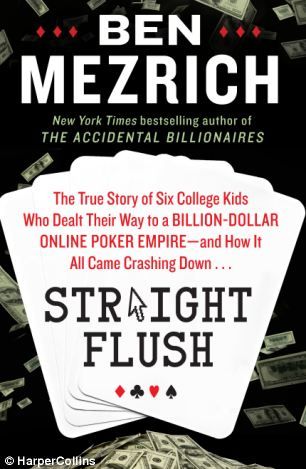
But, in the book the trip that Scott takes on the plane is his swan song after leaving the company because of the cheating incident. Then the plane crashes. In reality, the big event, the major tournament in which players were cheated was actually after the plane crash. September 12th, and it came out in October.
I don��t know when the discussions took place between Scott and the group about the cheating. So somewhere in there the plane crash happened. The timeline discussed, was how they told the story. They maintain they had this discussion with Scott and the crash happened when they were leaving the company. Whether or not the AP press releases came out after the crash or before, Scott & Hilt feel strongly they were leaving the company when they left with the plane. I don��t believe I dated these chapters specially because this whole period was uncertain. That��s how they told the story. My guess is that the cheating happened during this time period. They confronted Scott about the cheating and so Scott got on the plane to go. Then the press releases came out from AP saying they got rid of someone. My guess is their chronology is probably accurate.
I feel like the only reason Haley Hintze has a problem with that is she feels there is an agenda placing a plane crash there. When there really wasn��t an agenda because there was no money on the plane. I feel very confident there was no money on the plane.
Why do you feel so confident?
For one, there is no evidence. All there was were articles from the places like the Tiko Times. It started with some blog claiming there was money on this plane. If you��ve read any of my books I really want there to be money on that plane because that��s a great scene. I wrote a book called Busting Vegas where there was money on a plane. First of all, the FAA took over the crash site, and so did the Costa Rican government. There were no reports of money. Where is this money now?
Well, the Costa Rican government used the ��money on the plane�� theory to search Scott Tom��s house.
Why did he run off the plane? Why didn��t he go get his money? I��ve written about people who have been on planes with money. Trust me, they always go get the money. No one leaves $3 million on an airplane, especially a plane that is sitting on a runway in Costa Rica. Why would he not take his money off the plane? The whole idea came from one blog that got picked up by newspapers and we all know how newspapers are written. It��s very easy to write an article like that. I could put an article on the Boston Globe tomorrow about money being on that plane and it would get carried all over the Internet. I don��t think there was any money on the plane. If you can show me proof like an FAA report of confiscated money or an FBI report about confiscated money then I will agree. Until you can show me evidence then it just seems ludicrous to me. It seems foolish to me. Was it American dollars? Do they have a house full of money somewhere? Are they sitting on piles of cash? Why is it even in cash? Why wouldn��t they have wired it? In the online poker industry, where is there cash? No one is walking around with suitcases of cash. She (Hintze) was then advancing the idea that he lost the $3 million on the plane so he needed to cheat to make back the money. This is so absurd of an idea. That he had taken the amount out in cash and lost the money to the government and tried to get that money back. So I personally don��t believe there was money on that plane. It is all in the book. Nothing is being covered up. The sequence is very clear.
This is probably my best-sourced book. I had everybody talking to me. You can say that you disagree with what they are saying and that��s fine but you can��t say this isn��t a well-sourced book. You could say they are lying but you can��t say it isn��t a non-fiction book. This is from the point of view of the people who were there. You could say they were wrong but you can��t say I was making it up. There will people who no matter what I say, no matter where the information came from, will say Scott and the founding group of AP are cheaters and liars and stole our money. And there is nothing anyone can say to make them think differently. I��m not even trying to make them think different. I don��t know if Scott and friends stole your money or not. All I know is what happened in the book is the way they described what happened.
The big turning point of the book is the events of Black Friday. Can you delve in to that portion of the book?
I think it is so utterly clear that what the government did was so hypocritical and your audience will completely agree with this I think. It was so wrong and there was no reason why it happened. It was the destruction of an industry. It was a bad law that snuck in there and was entirely a money grab. The state of New York and the DOJ knew there was all this money they weren��t getting, and they were going to get it. So they took down these companies and ended up getting a lot of money out of it.
All that being said, in a lot of the press leading up to the book��s release you laud the founders as frat boys who were living the American dream and were crushed by the government, but did no wrong. What about the millions of dollars that was owed to players? That missing money certainly wasn't due to them being great guys all-American boys, did it?
They were very clear about what happened. Brent was the guy I spoke to most about this because he was supposedly the guy involved with it. First of all, I��m not going to say there wasn��t mismanagement going on and there wasn��t screw-ups going on. It seems clear to me that had they managed the money better, then a lot more people would have been paid off. I would like to put that out there right now. I��m not saying that these guys did a great job in that situation. I do believe what happened was they didn��t expect this to happen. It was a massive surprise to them. When it happened they did not have enough money lying around for a couple of reasons. For one, the payment processors were all shady and shitty. So they were using a lot of skeezy companies to move the company in and out because they were in this prohibition type of situation. Number two, they were attempting to grow their business to compete with PokerStars and Full Tilt Poker. So they were putting almost all of their money directly into marketing and advertising. There was a lot of money being thrown around.
Was there ever a discussion with the founders about segregating player funds, from operating funds?
No and I don��t think anyone ever mentioned that issue to me. They certainly weren��t brining that up. Scott and Hilt maintained they were not involved with the company past 2008. Scott may have been consulting in some way or another but I have no evidence they were involved with the company during that time.
Since the book came out though, there was the release of an audiotape from 2008 which makes assertions the founders were still involved.
How does that affect anything that happened?
Well in the book you make mention of them leaving the company in 2007.
Well, what they said to me was between 2007 and 2008. They said that to me from the beginning, so to me that didn��t seem to conflict with anything they were saying. Also that was another party claiming they were involved. I listened to that and thought it was intriguing. So certainly they may have still been involved in 2008. But were they involved in 2011? Maybe, maybe not. I don��t have any evidence. If there is evidence then that would be a great addendum to the book. They claimed they weren��t.
In my opinion, the government came in and shut it down by surprise. There are very few companies in the world that could pay everyone back if that happened. You could shut down Bank of America tomorrow if there wasn��t the FDIC, and then everyone would lose their money. There is no business in the world other than IBM that has enough money to pay its debts. Secondly, Costa Rican government had all these employees that needed to be paid, which was a few million dollars. They claimed the rest of the money was lost because the government wouldn��t allow them to process it.
Brent said he had a plan put together that would give everyone 75 cents on the dollar and the U.S. government rejected his plan. He said that was the end of that for them, when the U.S. government was holding everything and said you cannot do anything anymore. They blame the government. I think certainly there was mismanagement. I don��t think they were shut down and Scott and Hilt were grabbing bags of money and running out of the building. I don��t think Scott and Hilt were there anymore. I certainly don��t think Brent was looting the money. He��s going to jail with nothing. He��s learning how to cook in prison because he knows the next job he��ll get will be in a restaurant because someone with a federal record can still get a job there. Do Hilt and Scott have a lot of money? I don��t know. I��ve gone on and on about this with Scott telling him he��s not poor. He claims he has money, but not the amount people think he has. He thinks he��s not poor but he��s not rich.
When I interviewed Howard Lederer, he made it seem as if he was on a life crusade to ensure the players get paid back. Did the AP founders seem like they were eager to get players paid?
Hilt and Scott absolutely maintain that they had no way of doing anything. They feel bad for everyone who lost money but they don��t feel they had any control over the situation. Brent and Pete claimed they were attempting to find ways to pay back the players but the U.S. government wouldn��t let them do it. I think Scott would refuse to turn himself in and refuse to do anything because he didn��t feel like it was fair that they were shut down. He didn��t feel like it was fair he was being indicted and claims he had nothing to do with the company anymore. All he cared about at that point was ��why am I being indicted��? That was his response to the indictment.
So Scott was more concerned with his personal well-being, than trying to negotiate on behalf of thousands of players who his company wasn��t capable of paying?
He said he didn��t have any control of the company so how could he negotiate? He��s not the CEO of the company so what is he negotiating with? He claims he was not running the company. You would have to talk to Brent at that point. Brent said he did try and do that. That he was in control of the payment side of it but not running the company. Brent and Pete were trying to pay back people. Scott and Hilt claimed there weren��t involved so why would they try and pay back people? I don��t know the answer. It��s fair to ask. You could ask those guys and they would give the same answers. What Scott was doing was hiring lawyers to free himself from an indictment. There wasn��t segregated money in the player��s accounts. But it wasn��t a regulated company in a regulated industry.
Well it was regulated by the Kahnawake Gaming Commission, supposedly.
If the anger is aimed at the Kahnawake then I understand. I understand that people want someone to blame. If you want to blame Scott and Hilt then you would have to prove they were there at that time. You could try to blame Brent and Pete, but they tried to make a deal and were unable to. I have sympathy for those who lost money. I have friends who lost money. I think it��s unfortunate and horrible. I place blame solely on the government for not regulating the industry. If this were a regulated, legal industry then none of this would have happened. If players were taxed and things were run correctly then no one would have lost their money. That is where you should place the blame.
Have you spoken to the guys since? What are their thoughts on the book?
For the most part they feel like they have been fairly received. Every now and then I do an interview and get an angry phone call. And every now and then I get a happy phone call. So it really depends on the interview. I think Scott��s main issue when I do an interview is about how much money he had. I get that call a lot. He always asks, ��why would I have cheated?��
They are happy the industry is getting exposure. Pre-this book I don��t think Black Friday was getting mainstream attention. I don��t think the whole idea of online poker becoming legal was getting attention that it gets now. To a large extent I think this book was helpful to anyone who had a stake in the industry. I see it as a very positive thing because I am a big believer on online poker being legal. I��ve gone out there and doing the Today Show showing them how to play poker and telling the world that online poker should be legal.
Can we expect a movie out of Straight Flush?
We have a lot of people interested. I haven��t sold the rights yet. One of the issues is Runner Runner, which is coming out in September. That makes it difficult to sell this movie right now because everyone is wondering what that movie will do. So there will be a lot of studios interested but who want to see what Runner Runner does.
What sort of changes would you expect to see with a movie?
Movies need a villain. So I would guess that they would turn Scott into a villain, but then again I think that is what Runner Runner is. I feel like it is the AP story of poker with Ben Affleck playing Scott. I wouldn��t have any control over the situation. I would sell the rights to someone and then someone else would write it, and I would become a consultant on set. If you look at Bringing Down the House, Kevin Spacey��s character becomes the real villain. In real life his character wasn��t really a villain. So Hollywood tends to want a villain. It seems like poker blogs want a villain too. So whether the villain will be some FBI agent or Scott, there will be a villain. I think this would make a great movie.
Well thank you so much for your time, Ben. We look forward to potentially seeing the movie, and your other upcoming projects.
To stay up-to-date on a potential movie version of Straight Flush, and for all of your other poker news needs be sure to follow PokerNews on twitter.

